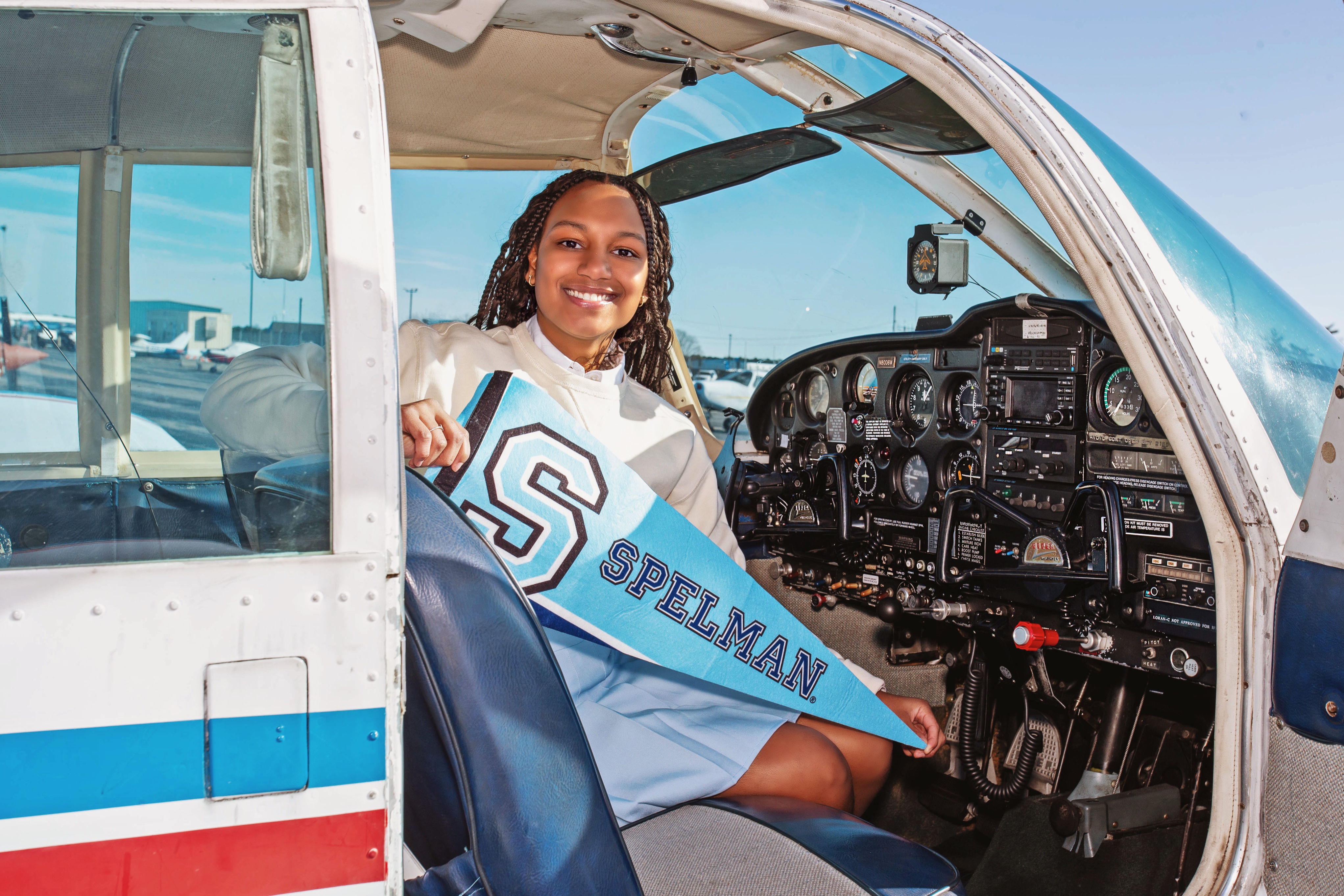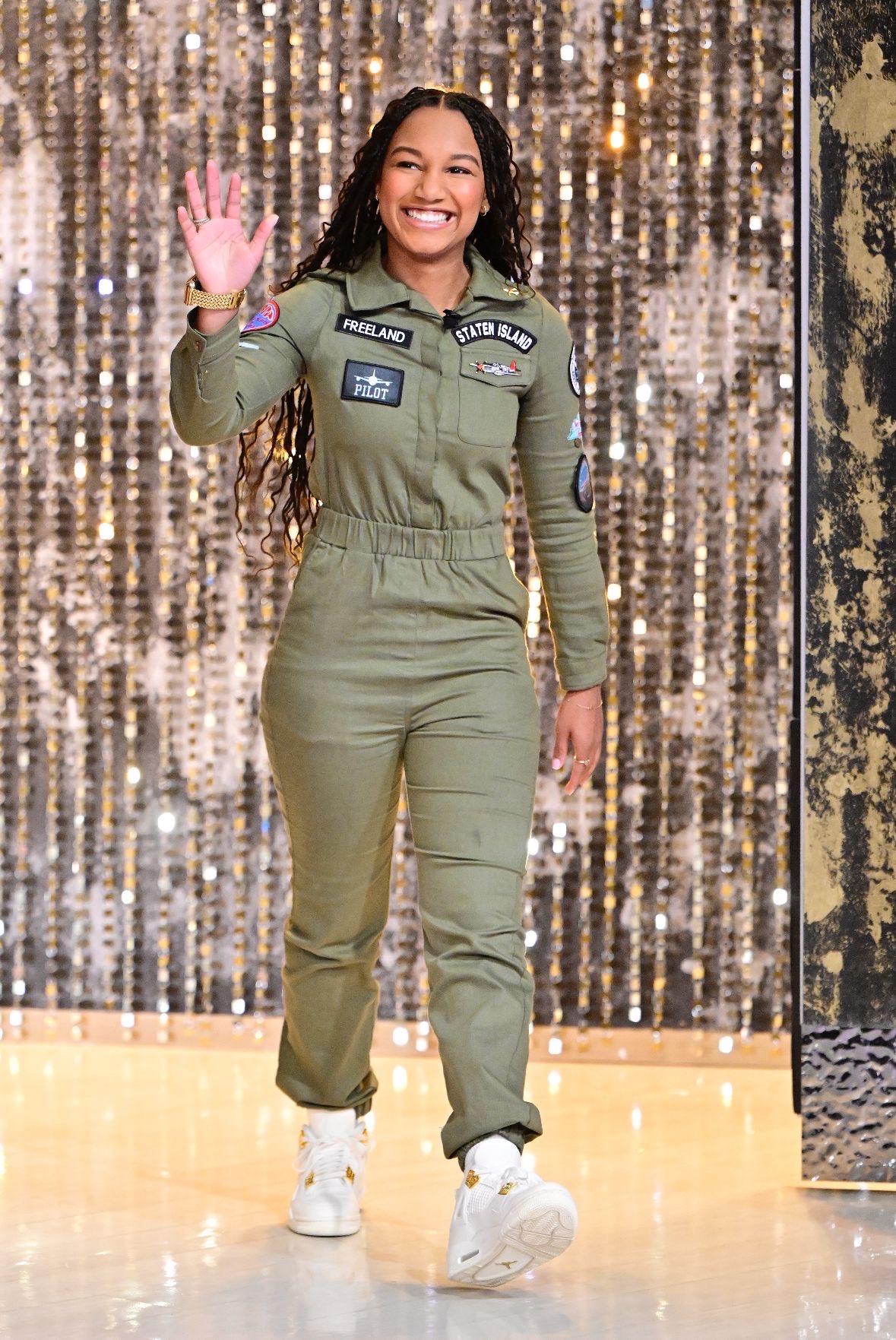18 March 2025 5 minute read
 At just 18 years old, Kamora Freeland, C'2028, has already proven that the sky is just the beginning. The Staten Island, New York, native made history as one of the youngest African American female pilots in the United States, earning her wings before she could drive. While aviation is where she’s made her mark, Freeland's ambitions stretch far beyond the cockpit.A lover of STEM, global exploration, and entrepreneurship, she is now charting a new course at Spelman College as an international studies major with a minor in entrepreneurship and innovation.
At just 18 years old, Kamora Freeland, C'2028, has already proven that the sky is just the beginning. The Staten Island, New York, native made history as one of the youngest African American female pilots in the United States, earning her wings before she could drive. While aviation is where she’s made her mark, Freeland's ambitions stretch far beyond the cockpit.A lover of STEM, global exploration, and entrepreneurship, she is now charting a new course at Spelman College as an international studies major with a minor in entrepreneurship and innovation.
Despite being a first-year student, Freeland is already classified as a sophomore, thanks to the college credits she earned while balancing flight training and dual enrollment at Kingsborough Early College Secondary School and Kingsborough Community College. Her academic excellence and trailblazing journey earned her a prestigious Presidential Scholarship to attend Spelman, where she is now a member of the Honors Program.
From Marine Biology to the Skies: A Passion for STEM
 Freeland's journey to aviation wasn’t always set in stone or even known to her. As a child, she was fascinated by the ocean and marine life, envisioning a career as a marine biologist. Her passion for STEM (science, technology, engineering, and math) fueled her curiosity, and she thrived in subjects that challenged her to think critically and solve complex problems.
Freeland's journey to aviation wasn’t always set in stone or even known to her. As a child, she was fascinated by the ocean and marine life, envisioning a career as a marine biologist. Her passion for STEM (science, technology, engineering, and math) fueled her curiosity, and she thrived in subjects that challenged her to think critically and solve complex problems.
However, when she discovered aviation at 15 years old through a scholarship from the United Youth Aviators program, she realized she could take her love of science to new heights — literally. Without her mother pushing her to give aviation a try, she may not have ever considered it as an option.
She trained at ATP Flight School and the U.S. Aviation Academy, demonstrating remarkable discipline and determination. Her dedication paid off when she earned her private pilot’s license before obtaining her driver’s license, a milestone that captured national attention.
A Global Perspective: Studying International Relations at Spelman
While Freeland's achievements in aviation are groundbreaking, her love for travel and global cultures played a significant role in shaping her academic journey. Having already visited multiple countries, she developed a deep appreciation for different cultures and international affairs, leading her to pursue a degree in international studies at Spelman College. Before she began classes at Spelman, she had already tapped into the offerings of the college’s Gordon Zeto Center for Global Education and traveled to Kenya with Planting A Seed International, a service-learning organization co-founded by Morehouse alumnus Matthew S. Wulukau Jr.
“Traveling has shown me that the world is so much bigger than we often realize,” Freeland said. “Understanding different cultures and global systems is just as important as understanding the physics of flight. That’s why I chose international studies—I want to connect my passion for aviation with a global perspective.”
Family Support -- the Ultimate Connection
Though Freeland has already achieved so much, she is quick to acknowledge that she hasn’t done it alone. She credits her mother’s unwavering support as one of the biggest factors in her success.
“My mom has always been my biggest cheerleader,” she said. “She believed in me when I doubted myself. She made sacrifices, encouraged me, and reminded me that I could do anything I set my mind to do.”
Another special source of support? Her older brother, who attends Morehouse College. Having him just next door has made her transition to college life even more meaningful.
“It’s great knowing my brother is right across the street,” Freeland said. “We push each other to be our best, and it’s amazing to share this HBCU experience with him.”
Breaking Barriers: Women and African American Women in Aviation
Freeland's accomplishments are particularly significant in the context of aviation demographics. Women remain underrepresented in the cockpit, comprising only about 5% of commercial pilots in the United States, which is below the international average, according to Airways Magazine.
The representation of African American women is even more striking. Less than 1% of U.S. pilots are Black women, equating to approximately 150 professional Black female pilots holding airline transport pilot, commercial, military, or certified flight instructor licenses, according to Travel Noire.
Organizations like Sisters of the Skies are working diligently to increase these numbers through mentorship, professional development, STEM outreach, and scholarships.
Spelman Women in Aviation
Freeland joins a growing list of Spelman women making their mark in aviation. Notable alumnae include:
La’Shanda R. Hawkins, C’2007: A lieutenant commander in the U.S. Coast Guard, Holmes became the first African American female helicopter pilot in the Coast Guard. A Bonner Scholar while at Spelman, she overcame growing up in the foster care system to put herself through college and now leads the Law Enforcement Division, where she protects South Florida’s borders against maritime threats. In 2024, she was honored by the Smithsonian’s National Air and Space Museum at its Women Take Flight: Stories of Air and Sea from the U.S. Coast Guard event; and Hawkins will be the Spelman Founders Day Convocation speaker on Thursday, April 10, 2025, at 10 a.m.
Dr. Sheila L. Chamberlain, C’81 made history as the first Black woman combat intelligence pilot in the U.S. Army. A magna cum laude graduate of Spelman College, she broke barriers in 1985, serving in critical missions across Grenada, Korea, and the Persian Gulf War. Dr. Chamberlain was the first woman elected to the national Tuskegee Airmen and is honored in the U.S. Air Force Hall of Fame. After retiring from the Army, she earned a law degree from the University of Miami and worked as a legislative assistant, advocating for women in aviation. Her efforts contributed to the Department of Defense’s decision to allow women to fly combat aircraft. A National Aviation Hall of Fame inductee, she also serves on the advisory board for Sisters of the Skies. In 2015, she was inducted into the Organization of Black Aerospace Professionals, further cementing her legacy as a trailblazer in aviation and military history.
Empowering Others: Freeland's Mission Beyond the Cockpit
As a trailblazer in aviation, Freeland understands the importance of representation and mentorship. She actively leads workshops to educate and inspire the next generation, particularly young women of color, on topics such as:
Her long-term goal? To open her own flight school and provide underrepresented communities with greater access to aviation training and career opportunities.
Flying has given me freedom, purpose, and a world of possibilities. I want to make sure that underrepresented communities and little girls that look like me have the same chance — to see aviation as a career, not just a dream. My goal is to build a flight school that opens the skies to everyone."
Building Wealth and Opportunities Through Entrepreneurship
In addition to her aviation and educational ambitions, Freeland has a keen interest in real estate and entrepreneurship. She believes financial literacy and ownership are key to creating generational wealth, and she is committed to investing in business ventures that provide long-term stability and impact.
“I don’t just want to break barriers — I want to create pathways for others to follow,” she said. “I see myself not just as a pilot, but as a businesswoman, a mentor and a leader in multiple industries.”
Despite her many accomplishments, Freeland remains grounded—both figuratively and literally. When asked about the challenges of aviation, she flashes a knowing smile.
“I want to dispel the myth that flying is hard. Flying is not hard. Landing is hard.”
Her statement highlights the technical challenge of landing an aircraft and is one she uses to navigate her busy life as a Spelman College student. While flying itself requires mastering the basic principles of flight, landing demands a high level of skill and precision. Pilots must manage their descent, control the aircraft’s speed, and make adjustments to accommodate changing conditions such as wind, weather, and visibility. The landing phase involves a delicate balance of factors, from approach speed to touchdown accuracy, making it one of the most difficult parts of a flight.
